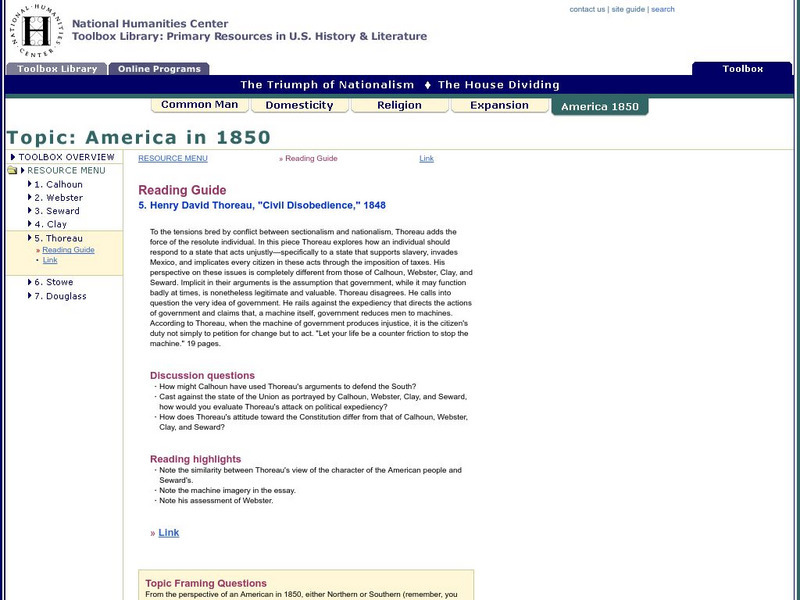Wisconsin Historical Society
Civil Disobedience
When is civil disobedience acceptable? Class members read examples of Jim Crow laws, an excerpt from Dr. Martin Luther King's "Letter from a Birmingham Jail," and a newspaper article and then consider the factors that make a law just or...
Stockton University Wordpress
Civil Disobedience: Is it ever ok to break the law?
As part of a study of civil disobedience, class members read excerpts from the writings of activists who were willing to break the law to protest unjust laws.
Curated OER
Civil Disobedience
In this online interactive literature instructional activity, students respond to 10 short answer and essay questions about Henry David Thoreau's Civil Disobedience. Students may check some of their answers on the interactive...
Curated OER
Civil Disobedience
In this online interactive philosophy quiz activity, students respond to 30 multiple choice questions about Thoreau's Civil Disobedience. Students may submit their answers to be scored.
Curated OER
Tracing the Idea of Civil Disobedience through Thoreau, Gandhi, and King
Students analyze civil disobedience through history studying Thoreau, Gandhi, and Dr. King. In this civil disobedience instructional activity, students read and analyze excerpts from Thoreau, Gandhi, and Martin Luther King. Students...
Curated OER
Understanding the Theoretical Basis for Civil Disobedience
Students analyze Henry David Thoreau's 'On the Duty of Civil Disobedience' and Dr. Martin Luther King's "Letter from Birmingham Jail." In this civil disobedience lesson, students read Thoreau's essay and answer 6 questions for the...
Curated OER
What Do We Owe To Thoreau?
Students use this design as an electronic reading and writing guide to Henry David Thoreau's famous essay, "On Civil Disobedience." They use activities to familiarize students with the political issues of Thoreau's time. Comprehension...
Walden Woods Project
19th Century Lessons for 21st Century Lives
The words of Henry David Thoreau on Civil Disobedience seem particularly relevant today, as are his writings and those of other transcendental thinkers who ask what it mean to live deliberately and what are the responsibilities of...
Curated OER
A Different Drummer
Eighth graders investigate philosophy and meditation techniques by discussing Emerson and Thoreau. In this philosophical traditions lesson, 8th graders identify the men Ralph Waldo Emerson and Henry David Thoreau, their work, and...
Northshore School District
American Voices and Their Audiences
Those new to teaching an AP level language and composition prep course and seasoned veterans will find much to treasure in a unit that is designed to help young language scholars develop the skills they need to analyze the language...
Curated OER
Thoreau, Gandhi, and Martin Luther King, Jr.
Students explore the concept of non-violent resistance. In this political philosophies lesson, students study the political tactics of Mohandas Gandhi, Henry David Thoreau, and Martin Luther King, Jr. in order to discover how each of...
Curated OER
H.D. Thoreau's Philosophy of Government
Students read an essay by H.D. Thoreau as analysis of his philosophy on government. In this Thoreau analysis instructional activity, students work in groups to paraphrase two of Thoreau's criteria for his beliefs about government....
Curated OER
Abolitionists in U.S. History
Students read and discuss excerpts from the writings of Henry David Thoreau, Frederick Douglass and Sarah Parker Redmond. They compare and contrast the views of the three abolitionists concentrating on the experiences and reasons for...
Annenberg Foundation
Migrant Struggle
The American Dream is a goal that many pursue, but is it truly attainable for all people? An in-depth lesson explores the plight of migrants in twentieth-century America. The resource includes a video and author biographies and...
Museum of Tolerance
The Price of Personal Responsibility
A reading of Patrick Henry's "Speech in the Virginia Convention," Henry David Thoreau's "Civil Disobedience," and Rev. Martin Luther King, Jr.'s "Letter from Birmingham Jail" launch a discussion about the price one is willing to pay to...
Curated OER
Muhammad Ali and his Vietnam War Resistance: Defining Nonviolent Action through Gandhi and King
Students research Muhammad Ali's act of civil disobedience. In this civil disobedience lesson, students research Ali's defiance of the Vietnam War draft and compare his reasoning to Martin Luther King's thoughts on the war. Students...
Curated OER
Non-violent Protest Through The Ages
Students are introduced to non-violent ways to solve disagreements with others. In groups, they analyze the ways Martin Luther King, Gandhi and Thoreau shared their views in non-violent ways. They complete a sketch of the life of each...
Curated OER
Criticism of Modernity: Gandhi's Association with the American Transcendentalists
Eleventh graders explore Gandhi's philosophy links to the works of American Transcendentalists Emerson and Thoreau. In this transcendentalism lesson, 11th graders discuss essential questions about civilization and modernity.
Curated OER
American Transcendentalism and Buddhism:
Students study American transcendentalism through readings of Emerson and Thoreau. They make cognitive connections to the similarities to Buddhism in these writings. The connection of the literary movement is explained in the art of the...
Curated OER
Give Peace A Chance: Nonviolence as a valid strategy for social change
Students analyze how people solve conflicts. In this conflict resolution lesson, students look at Mahatma Gandhi and Martin Luther King's nonviolence movements. They see the reasoning behind nonviolence and how it works.
Curated OER
Court Documents Related to
Pupils use the National Archives to researcj cout coduments related to Martin Luther King, Jr.
Curated OER
Anonymous Patriots: Songs of the Revolution
Give your class a deeper understanding of the context and meaning behind early American song lyrics. By reading the lyrics to "Yankee Doodle" and "Revolutionary Tea," high schoolers will practice analysis by examining the...
National Humanities Center
National Humanities Center: America in Class: Thoreau's Critique of Democracy in "Civil Disobedience"
National Humanities Center lesson explores the criticisms Thoreau makes about a representative democracy form of government. Lesson includes interactive assignments, teacher notes, strategies for Close reading, follow-up and vocabulary.
National Humanities Center
National Humanities Center: Toolbox Library: Henry David Thoreau: Civil Disobedience: 1848
Thoreau's essay that calls for citizens to break unjust laws, particularly those promoting the continuation and expansion of slavery.























